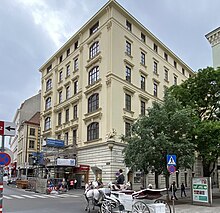

The Anglo-Österreichische Bank (lit. 'Anglo-Austrian Bank'), in shorthand Anglobank, was a bank founded in Vienna in 1863 with an extensive branch network in the Habsburg Monarchy and later in its successor states, primarily Austria and Czechoslovakia.
Following the collapse of the monarchy, the Anglobank came under the control of the Bank of England, and in 1921, its head office was moved to London where it was restructured as the Anglo-Austrian Bank. In 1926, it was renamed Anglo-International Bank to reflect the sale that year of most of its Austrian activities to Creditanstalt. As a consequence, the Anglo-International Bank became one of the Creditanstalt's main shareholders, and played a role in the internationally consequential collapse of Creditanstalt in 1931. After 1933, Anglo-International Bank stopped making new commitments. It remained formally in business until 1951, and was eventually liquidated in 1962.
In Czechoslovakia, the former Anglobank branches were restructured in 1922 into a significant domestic bank, the Anglo-Czechoslovak Bank headquartered in Prague, which remained in activity until being absorbed by Živnostenská Banka in 1948.
From its creation until leaving Austria in 1921, the Anglobank headquarters remained located in the Palais Montenuovo at Strauchgasse 1–3, opposite the Old Vienna Stock Exchange. In 1864. The Anglobank had initially rented parts of the palace. It bought the property and remodeled it in 1871, whereby the courtyard was covered with glass and from then on served as a cash room. The building was repurposed after World War II as head office of Oesterreichische Kontrollbank.